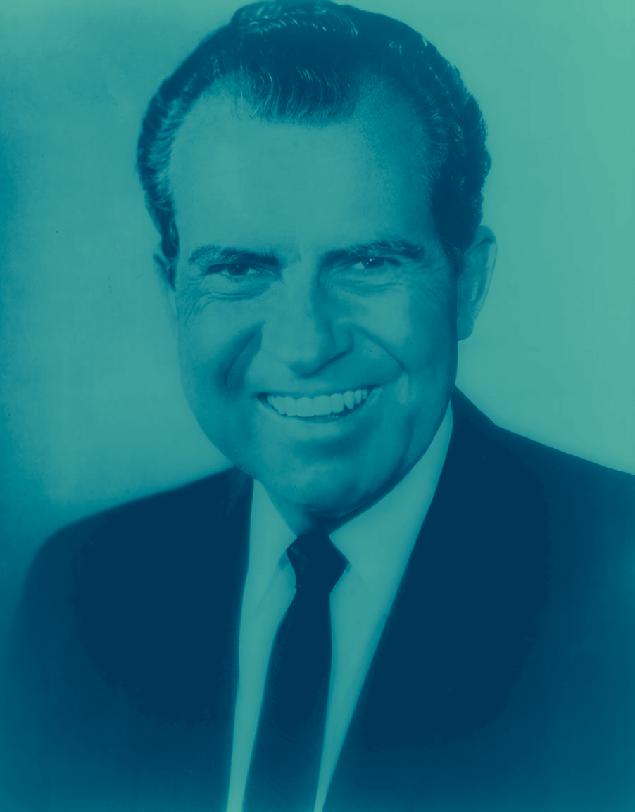
6 minute read
In Search of a Statesman


The Lessons of Gerald Ford and Richard Nixon

By Randall Peterson
“My fellow Americans, our long national nightmare is over.”
So declared Gerald Ford upon taking the oath of office as president, August 9, 1974, only 30 minutes after Richard Nixon resigned. The national nightmare was a corrupt and criminal presidency.
And those words have never mattered more than now. Thus, how did it end, and what are the lessons?
The Pardon
Less than a month later, Ford codified the official end of the Nixon Era and committed the defining act of what would be his two-and-a-half-year presidency — the pardoning of Richard Nixon. Relying on his powers under Article II, Section 2 of the Constitution, Ford issued “a full, free, and absolute pardon…for all offenses against the United States” that Nixon “committed or may have committed.”
On that September evening, 1974, Ford announced the pardon to the American people. Despite some fawning expressions of sympathy for the disgraced former president, Ford reasoned that it was not Nixon’s fate that concerned him, but, “My concern is the immediate future of this great country…My conscious tells me it is my duty, not merely to proclaim domestic tranquility but to use every means I have to ensure it.”
Thus, the exclamation point at the end of Ford’s long national nightmare declaration.
Pardoning Nixon, while shocking on the surface and seemingly denying justice to those who chanted “jail to the chief” for potential defendant Richard Nixon, a larger constituency of potential plaintiffs was best served, the American people. Reasonable people disagreed then and now of allowing Nixon a pass for his constitutional crimes. Nor does this suggest that a pardon is a preferred or only way to start anew from bad actors. But in 1974, the pardon was not about forgiveness but finality.
Ford knew this act would cost him votes, and it did, losing a close election to Jimmy Carter in 1976. But in pardoning Nixon, Ford began the process of healing a country that desperately needed healing. In essence, Gerald Ford’s controversial pardon did more to salvage the presidency, an office he alone in the annals of history was never elected to, than he could have ever known or arguably could have even accomplished in a full or second term.
In Hindsight
If not at the time, Ford’s act was recognized a generation later when he received the John F. Kennedy Profile in Courage Award in 2001. In presenting the award, Senator Edward Kennedy said, “America was fortunate that it was Gerald Ford who took the helm of the storm-tossed ship of state.” Kennedy acknowledged the opposition of most Americans, including his own at the time, saying, “I was one of those who spoke out against his action then. But time has a way of clarifying past events, and now we see that President Ford was right. His courage and dedication to our country made it possible for us to begin the process of healing and put the tragedy of Watergate behind us.”
Ford may have been an accidental and unelected president, but there are lessons there for any statesman who may yet stand for the public good despite the consequence.
The Acceptance
Nixon, too, showed but a glimpse of the realization that the awesome power of the presidency extends beyond the private use of its individual occupant, albeit on his very last day in office. In his farewell address to White House staff, the American people witnessed something never seen before by Nixon.
Nixon spoke first of loss. “We think sometimes when things happen that don’t
go the right way, we think that when you don’t pass the bar exam the first time… we think that when we suffer a defeat that all has ended.” He went on,
“Because the greatness comes not when things go always good for you, but the greatness comes and you’re really tested, when you take some knocks, some disappointments, when sadness comes. Because only if you’ve been in the deepest valley can you ever know how magnificent it is to be on the highest mountain. Never get discouraged. Never be petty. Always remember others may hate you but those who hate you don’t win unless you hate them. And then you destroy yourself.”
I have struggled for many years to fully comprehend the gravity of those final words. Maybe they were a self-serving reputational rebuild having no one left to lie to? Or maybe they were a genuine expression of humility and humanity with the deep sense of remorse that becomes visible only at the rock bottom of the abyss? Regardless, it was ultimately the vanquished accepting his fate that was required for the country to move on.
In other words, even Nixon knew when to go.
Ironically, I happened upon this speech and was reading these words only days before my own bar results were announced. I found it foreboding and an ill-omen. Yet, if that were to happen, which it did for me, I also took preemptive comfort in the words, “only if you have been in the deepest valley, can you ever know how magnificent it is to be on the highest mountain,” which I was able to experience the second time around.
There are lessons to be learned from the Nixon of that speech, August 9, 1974. The Nixon that at least, acted as a statesman.
Moving Forward
The connection between Nixon and Ford goes far beyond both the presidency and the pardon into a realm of ignominious firsts. Ford, the only president never to win the office on his own accord; and Nixon, the only president to lose it by his own choosing. And yet, in their own way and on their own terms, they both discovered what it means to be a president statesman by what they did as well as what they did not do.
Both Ford and Nixon offered acts of fitting closure rather than purposeful chaos. There were no preemptive and baseless challenges of an election outcome, no preliminary appeal for Supreme Court intervention, and certainly no calls for armed militias to stand back and be ready.
Franklin Roosevelt stated in his first inaugural in 1933, at the height of the Great Depression that, “only a foolish optimist can deny the dark realities of the moment.” Similarly, in the waning days of 2020, there is no doubt a great pall weighs heavy upon the country. Let us hope for a peaceful transition of power, if warranted by the election, and let us further hope that however late, somewhere, somehow, a statesman emerges who realizes the finality of occupants and offices, with the only permanence belonging to the Republic itself.
Only then, through words or actions, can we again say in collective chorus what is so very needed: that our long national nightmare is over.
RANDALL PETERSON is an instructor of Business Law at Front Range Community College and a licensed attorney. Mr. Peterson serves as a City Councilman for Northglenn, Colorado.






California’s most respected neutrals are now offering mediations nationwide using secure video conference technology.
S I G N A T U R E R E S O L U T I O N . C O M

